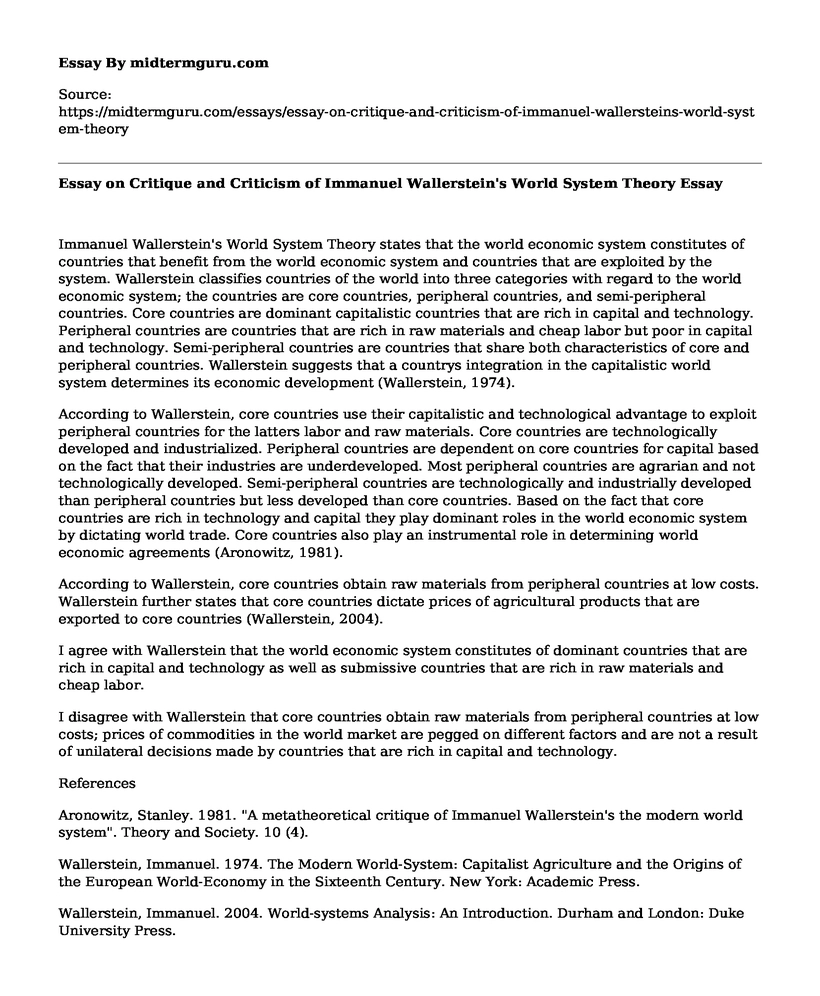Immanuel Wallerstein's World System Theory states that the world economic system constitutes of countries that benefit from the world economic system and countries that are exploited by the system. Wallerstein classifies countries of the world into three categories with regard to the world economic system; the countries are core countries, peripheral countries, and semi-peripheral countries. Core countries are dominant capitalistic countries that are rich in capital and technology. Peripheral countries are countries that are rich in raw materials and cheap labor but poor in capital and technology. Semi-peripheral countries are countries that share both characteristics of core and peripheral countries. Wallerstein suggests that a countrys integration in the capitalistic world system determines its economic development (Wallerstein, 1974).
According to Wallerstein, core countries use their capitalistic and technological advantage to exploit peripheral countries for the latters labor and raw materials. Core countries are technologically developed and industrialized. Peripheral countries are dependent on core countries for capital based on the fact that their industries are underdeveloped. Most peripheral countries are agrarian and not technologically developed. Semi-peripheral countries are technologically and industrially developed than peripheral countries but less developed than core countries. Based on the fact that core countries are rich in technology and capital they play dominant roles in the world economic system by dictating world trade. Core countries also play an instrumental role in determining world economic agreements (Aronowitz, 1981).
According to Wallerstein, core countries obtain raw materials from peripheral countries at low costs. Wallerstein further states that core countries dictate prices of agricultural products that are exported to core countries (Wallerstein, 2004).
I agree with Wallerstein that the world economic system constitutes of dominant countries that are rich in capital and technology as well as submissive countries that are rich in raw materials and cheap labor.
I disagree with Wallerstein that core countries obtain raw materials from peripheral countries at low costs; prices of commodities in the world market are pegged on different factors and are not a result of unilateral decisions made by countries that are rich in capital and technology.
References
Aronowitz, Stanley. 1981. "A metatheoretical critique of Immanuel Wallerstein's the modern world system". Theory and Society. 10 (4).
Wallerstein, Immanuel. 1974. The Modern World-System: Capitalist Agriculture and the Origins of the European World-Economy in the Sixteenth Century. New York: Academic Press.
Wallerstein, Immanuel. 2004. World-systems Analysis: An Introduction. Durham and London: Duke University Press.
Cite this page
Essay on Critique and Criticism of Immanuel Wallerstein's World System Theory. (2021, Jun 10). Retrieved from https://midtermguru.com/essays/essay-on-critique-and-criticism-of-immanuel-wallersteins-world-system-theory
If you are the original author of this essay and no longer wish to have it published on the midtermguru.com website, please click below to request its removal:
- Essay on Globalization and International Security
- Essay on Roles of Financial Institutions in Our Economy
- Rising Employment and Housing Costs in Philadelphia - Essay Sample
- Unifying the Social World: How Labor Unites People from Diversified Backgrounds - Essay Sample
- Cultural Qualities and CSR: Exploring Sao Paulo, Brazil and Shenzhen, China - Essay Sample
- HRM: Selecting & Equipping Employees for Success - Essay Sample
- Employee Rights Protected by Labor Laws - Research Paper







